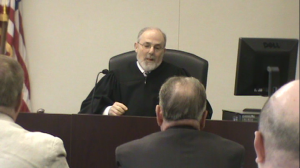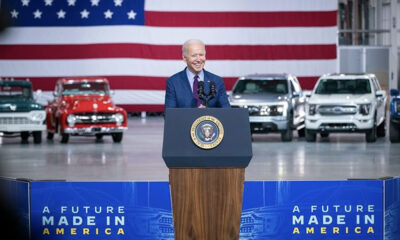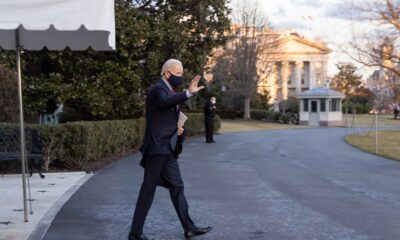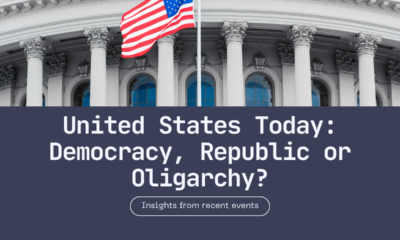Constitution
Obama eligibility: natural-born citizen

Has the phrase natural-born citizen lost its meaning? New Jersey Administrative Law Judge Jeff S. Masin implied that when he dismissed the latest Obama eligibility case (Purpura & Moran v. Obama, STE 4534-12). But a closer look at the precedents he cites, says no. To infer anything else is to show how wrong it is to regard the United States Constitution as “a living document” and thus allow courts to change the meaning of its words at will.
Natural-born citizen in the Obama eligibility context
Nick Purpura and Ted Moran argued that the name of Barack H. Obama should not appear on a New Jersey Democratic primary ballot, for two reasons:
- No one can say for certain who “Barack H. Obama” is, where he was born, or even when he was born.
- Even if he was born in Honolulu, HI, as he says, his father was a British colonial subject. So Obama cannot be a natural-born citizen.
That last phrase is key. Article II, Section 1, Clause 5 of the US Constitution reads in part:
No person, except a natural-born citizen, or a citizen of the United States at the time of the adoption of this Constitution, shall be eligible to the office of President.
Most Obama eligibility cases focus on the disputed Obama birth certificate. That document did not even figure in this case. Obama’s campaign never offered it to the New Jersey Secretary of State, in any form, hard-copy or soft-. Judge Masin even asked his lawyer, Alexandra Hill, to concede that point, and she did.
Judge Masin concluded that Obama need not produce anything. More than that, he offered this exact conclusion:
the petitioners have failed to meet their burden to [show] that Barak Obama failed in any obligation to prove to the Secretary of State that he [qualifies] to hold the Presidency and that he is a “natural born Citizen” of the United States of America, as required by the United States Constitution.
Many bloggers, sympathetic to Mr. Obama, have construed that to say that Judge Masin has somehow “ruled” that Barack H. Obama is a natural-born citizen. That’s not necessarily what that sentence means. The sparing way that Masin punctuated that sentence makes it say that Purpura and Moran did not prove that Obama had failed in any duty he might have to prove that:
- He qualifies for the office of President, and
- He is a natural-born citizen.
Natural-born citizen: federal case law
Masin mentions three federal cases in trying to decide what a natural-born citizen is. Purpura and Moran mentioned one: Minor v. Happersett, 88 US 162 (1875). Masin, quoting an Indiana case (Ankeny v. Gov. Ind., 916 N.E.2d 678 (Ind. Ct. App. 2009)), mentioned the other two: US v. Wong Kim Ark, 169 US 649 (1898), and US v Rhodes, 1 Abbott, US 28 (Cir, Ct. Kentucky, 1966), that another blogger quotes here. (Judge Masin mis-quoted the year of the Rhodes case; he lists it as 1860, not 1866. Tellingly, the bloggers who triumphantly quote his decision never catch the mistake. From this, CNAV concludes that they are not doing their own research.)
The Minor case defines “natural-born citizen” better than any other case.
The Constitution does not, in words, say who shall be natural-born citizens. Resort must be had elsewhere to ascertain that. At common-law, with the nomenclature of which the framers of the Constitution were familiar, it was never doubted that all children born in a country of parents who were its citizens became themselves, upon their birth, citizens also. These were natives, or natural-born citizens, as distinguished from aliens or foreigners. Some authorities go further and include as citizens children born within the jurisdiction without reference to the citizenship of their 168*168 parents. As to this class there have been doubts, but never as to the first. For the purposes of this case it is not necessary to solve these doubts.
Note the sentences that CNAV emphasizes. The Minor court said: Any person born in-country to citizen parents is a natural-born citizen. Whether a person born in-country to two parents, one or both of whom might not be a citizen, is a citizen himself, is still in doubt. And the Minor case never sought to resolve that. And where did the Minor court get its definition? From Emmerich de Vattel’s Law of Nations. It reads in relevant part:
The citizens are the members of the civil society; bound to this society by certain duties, and subject to its authority, they equally participate in its advantages. The natives, or natural-born citizens, are those born in the country, of parents who are citizens. As the society cannot exist and perpetuate itself otherwise than by the children of the citizens, those children naturally follow the condition of their fathers, and succeed to all their rights. The society is supposed to desire this, in consequence of what it owes to its own preservation; and it is presumed, as matter of course, that each citizen, on entering into society, reserves to his children the right of becoming members of it. The country of the fathers is therefore that of the children; and these become true citizens merely by their tacit consent. We shall soon see whether, on their coming to the years of discretion, they may renounce their right, and what they owe to the society in which they were born. I say, that, in order to be of the country, it is necessary that a person be born of a father who is a citizen; for, if he is born there of a foreigner, it will be only the place of his birth, and not his country.
The defendant/respondent Wong Kim Ark came to the Supreme Court after the government tried to expel him for his Chinese nationality. His parents were temporary railroad workers, and were not Chinese diplomats. By any reasonable standard, Wong Kim Ark was born in the United States and was subject to its jurisdiction. That made him a citizen.
Obama eligibility apologists have repeated ad nauseam that the Wong court not only said that Mr. Wong could stay in America, but that someday he could run for President. That is utterly unfounded. Not one word in the majority opinion in Wong says, or implies, that “Wong Kim Ark for President!” would have been a legitimate campaign slogan.
(As an aside, the Wong ruling applies to one born in-country of lawful residents. So the “anchor baby syndrome” has an instant remedy: read the opinion, and stop reading into it. The Wong court would not have held that the children of illegal aliens were themselves citizens by sole reason of location of birth. Neither might they have held that a “birth tourist,” typically a foreign-born woman staying at an American hotel, going into labor, and riding in an American ambulance to an American hospital for admission to an American labor-and-delivery suite, could ever confer American citizenship on her baby by so acting.)
The other case that Judge Masin cited was US v. Rhodes. The linked quote is, as the Webmaster admits, incomplete. Whether the Court in that case correctly used the word citizen interchangeably with the phrase natural-born citizen is impossible to determine. The reason: the quoted text lays no foundation for conflating those two terms.
So where do the Obama eligibility apologists stand? Either the Supreme Court still defines a natural-born citizen as a special class of persons born in-country to citizen parents, or it does not. And if not, then it can only have re-defined that phrase through the sort of “penumbras” of which Justice William O. Douglas was so fond in Roe v. Wade. Here, then, is the danger of regarding the US Constitution as “a living document.” To say that is to say that the Constitution means whatever the Supreme Court of the United States says it means, the last time it said it in any specific context. That Judge Masin stands on this “living document” belief is clear from his remarks, in the below-embedded video, to Mario Apuzzo, counsel for the petitioners. He briefly acknowledges Vattel, and other Supreme Court case law, including Minor. And then he sets that aside as of no moment in construing the Wong case as:
- Conflating the terms “citizen” and “natural-born citizen,” and
- Defining, or re-defining, “natural-born citizen” as one born in-country whether the parents were citizens or non-citizens, so long as they were both lawful residents.
Even that is a very slender reed. Barack Obama, Senior, did not live at the same address as did Stanley Ann Dunham Obama. He lived in a “bachelor pad” in downtown Honolulu. Nor has anyone shown that Obama, Senior was a lawfully domiciled resident at the time.
Or else the Constitution, as Thomas Jefferson warned after the Supreme Court’s decision in McCullough v. Maryland,
is now become a thing of wax, which the Court may shape and mold as it pleases.
J. B. Williams (Canada Free Press) warned the American people against just this mind-set nearly two years ago. He bluntly said that if we cannot preserve the office of President from foreign influence, nothing else matters. More to the point, if we cannot rely on a word or phrase to mean the same thing today as it meant when James Madison and his colleagues wrote it, we have no Constitution. We ignore that warning at our peril.
Related:
- Obama eligibility: NJ ALJ makes new law
- Obama eligibility: NJ ALJ ducks issues
- Obama eligibility witnesses: Clinton campaign
- Obama eligibility challenge in New Jersey
- Obama: who is he?
- Obama birth certificate details
- Obama birth certificate petition
- Obama eligibility battle in Arizona legislature
- Obama birth certificate still suspect
- Obama born in Kenya?
- Presidential succession crisis
- Does anybody really know what time it is?
- Obama birth certificate investigation
- Obama birth certificate fraud analysis
- Obama birth certificate fraud
- Natural born citizen: what that means
- Obama eligibility: reactions to ruling
- Obama eligibility: flawed ruling
- Obama eligibility challenges multiply
- Obama eligibility challenges explode
- Obama eligibility challenges go forward
- Obama birth certificate does not satisfy
- Obama releases official-looking birth certificate
[amazon_carousel widget_type=”ASINList” width=”500″ height=”250″ title=”” market_place=”US” shuffle_products=”True” show_border=”False” asin=”B00375LOEG, 0451947673, 0800733940, 0062073303, 1595230734, 1936218003, 0981559662, 1935071874, 1932172378, 1936488299″ /]

Terry A. Hurlbut has been a student of politics, philosophy, and science for more than 35 years. He is a graduate of Yale College and has served as a physician-level laboratory administrator in a 250-bed community hospital. He also is a serious student of the Bible, is conversant in its two primary original languages, and has followed the creation-science movement closely since 1993.
-

 Executive4 days ago
Executive4 days agoSecret Service chief gets no solace
-

 Civilization5 days ago
Civilization5 days agoBiden drops out of race
-

 Executive2 days ago
Executive2 days agoWaste of the Day: Louisville Taxpayers Pay Nearly $600,000 For Empty Building’s Maintenance, Security
-

 Guest Columns4 days ago
Guest Columns4 days agoFear Itself: Democrats’ Favorite Strategy Caused Their Current Chaos
-

 Executive3 days ago
Executive3 days agoWhere is Joe Biden – or Jill?
-

 Executive1 day ago
Executive1 day agoWaste of the Day: Throwback Thursday: Cities Used Crime Prevention Funds on Soccer Games, Paper Shredding
-

 Civilization4 days ago
Civilization4 days agoBuild Iron Dome in the United States To Prepare for Israel’s Worst Day
-

 Executive2 days ago
Executive2 days agoFacile and politically motivated suggestions
















I’ve done a little bit of research on this, and I came upon the opinion of the Kim Wong Ark case, written by Horace Gray.
The opinion openly admits that the US constitution does not define natural-born citizen, and so relies on common law to define it.
I quote the opinion”
“The fundamental principle of the common law with regard to English nationality was birth within the allegiance, also called “ligealty,” “obedience,” “faith,” or “power” of the King. The principle embraced all persons born within the King’s allegiance and subject to his protection. Such allegiance and protection were mutual — as expressed in the maxim protectio trahit subjectionem, et subjectio protectionem — and were not restricted to natural-born subjects and naturalized subjects, or to those who had taken an oath of allegiance, but were predicable of aliens in amity so long as they were within the kingdom. Children, born in England, of such aliens were therefore natural-born subjects. But the children, born within the realm, of foreign ambassadors, or the children of alien enemies, born during and within their hostile occupation of part of the King’s dominions, were not natural-born subjects because not born within the allegiance, the obedience, or the power, or, as would be said at this day, within the jurisdiction, of the King.”
So unless the US was at war with the UK at the time, I think it’s safe to say that Barack Obama is a natural born citizen.
I found the opinion here:
link to law.cornell.edu
Additionally, if you doubt that Barack Obama was born in the United States, you have little to go on. There is no evidence to indicate that Obama’s mother, Ann Dunham, was ever anywhere but the US for Obama’s birth, and indeed, no evidence that she had ever been to any foreign nation other than Indonesia (well after Barack Obama was born).
I do hope you’ll lay this matter to rest.
To paraphrase a certain AI character: I’m sorry, CamilleT; I’m afraid I can’t do that. I find your analysis flawed. Voting citizenship he might have, but the kind of citizenship that makes a President? The Wong court didn’t even discuss that.
The definition by the Minor court still stands. And for good reason, as we have seen with the performance-in-office of the man now holding it.
But if your basic contention against the eligibility of Obama is that he does not meet the definition of “natural born citizen,” what do you make of the line
“Children, born in England, of such aliens were therefore natural-born subjects” from the Kim Wong Ark case?
Moreover, Kim Wong Ark occurred after the Minor case. I am leaning over the boundaries of my expertise here, but I do believe that more recent cases take precedent.
What do I make of that line in the Rhodes case? That line alone merely tells what the English did. But that court erred in construing English Common Law as United States Federal Common Law. My sources have historical evidence, in the form of letters from Constitutional Conventioneers, including Chief Justice-to-be John Jay, that refute that proposition utterly.
Your second comment assumes that the laws of the United States have a generalized and implicit Abrogation Principle, akin to that which governs contradictory statements in the Muslim Qu’ran. That statement is utterlyl without foundation. If Wong sought to abrogate Minor on this point, the opinion would have said so. I saw not so much as one statement saying, “We reverse.” Abrogation in American law must be explicit to have force and effect.
I therefore conclude that Minor stands unreversed on this vital point.
I also challenge you to find the instance in the Wong opinion that says, or implies, that “Wong Kim Ark for President!” would have been a legitimate campaign slogan, had such conformed to Wong Kim Ark’s wishes and desires.
May I ask for a link to these letters? Thank you.
Working on it.
People who quote Minor v Happersett for the 2 citizen parent theory are flat out wrong. Minor was a voting rights case. The comment about natural born citizens is what’s called an “obiter dictum” — not part of the holding of the case. Since it didn’t matter what kind of citizen Virginia Minor was, the parties to the case didn’t present arguments on natural born citizenship. It wasn’t a question the case needed to answer. Minor isn’t cited (mentioned in other cases) these days as a case of citizenship by birth, it’s cited as a “privileges and immunities of citizenship” case. Minor said that there was no doubt that a child born in the US to citizen parents was a natural born citizen, that some people had doubts about whether birth in the US regardless of the parents’ status were citizens at birth, but that for this case it didn’t matter. Since Minor had 2 citizen parents, and was born in the US, they didn’t need to go further and address those doubts.
Those doubts were cleared up by the controlling citizenship case, Wong Kim Ark v United States. WKA went into great detail about the history of citizenship at birth in England, the colonies, and the USA and the history of the 14th Amendment. WKA was born in the USA to non-citizen Chinese parents at a time when Chinese immigrants were barred from citizenship. The Supreme Court found that because WKA was born on US soil, he was a citizen at birth regardless of the status of his parents. Citizen at birth = natural born citizen. This case cited Minor and went further; therefore WKA v US is controlling. It’s one of the most cited cases. Because Obama was born in Hawaii after Hawaii became a state, he’s a natural born citizen and eligible to be president.
Actually, Minor was cited, until Justia.com took down the citations from twenty-five other cases. And as I read it, it’s still part of the opinion, and not only that, the per curiam opinion. Don’t cry to me about obiter dicta: I’ve seen passages that might so qualify, cited in holdings elsewhere.
And furthermore: I saw nothing definitive in the Wong opinion that equated “citizen at birth” with “natural born citizen.” Such an equation would be utterly without foundation in any event.
Unless you’re one of those people who believes that the Constitution well and truly ought to mean whatever the Supreme Court says it means, the most recent time that it says it. In which event, we no longer have a written Constitution, but a purely ad hoc Constitution that depends on nine people’s moods.
Terry, you should go back and read your own article again. It is quite clear that the comment that you rely on in ”Minor” is obiter. Not only that, but it doesn’t even deal with the issue you are arguing about. How can you possibly state that it represents the state of the law on “natural born citizens” in those circumstances? That is an utterly untenable stance.
As for the Supreme Court and the Constitution, as a matter of simple fact the Constitution ”does” mean what the Supreme Court says it means. Your problem is that you want it to mean what ”you” say it means. I can understand why you might want that but I don’t see it happening on a practical level.
Clearly you and I will never agree on what a Constitution means. You are content to have the Supreme Court change it, and the meaning of its words, at will. I am not.
No. I didn’t say I was content have the Supreme Court *change* the Constitution, did I? I am content for the Supreme Court to decide what it means. However, I am not content to have *you* decide what it means. And I think most of America would be with me on that point.
Clearly, in circumstances where the Constitution contains no definition of “natural born citizen” and where there is a dispute as to what the phrase means, someone has to decide that meaning. Just because a court makes such a decision and that decision conflicts with your favoured interpretation does not mean that the court is changing the Constitution.
When a Court ignores ample documentary evidence of the original intent of the Constitution, it changes that Constitution.
Please show me where these passages are citing Minor.
Justa.com is not the sole source for court records and from what I have seen you can find the correct info there. Please stop crying over Justia.com scrubbing their site it is a non-issue. I will accept the supreme courts interpretations over what you or your blog has to say any day of the week.
I think you’ll find you’ll be a lot more convincing if you’re cordial.
[…] Natural-born citizen […]
[…] Natural-born citizen […]
[…] Natural-born citizen […]
[…] Natural-born citizen […]
[…] Natural-born citizen […]
[…] Natural-born citizen […]
[…] Natural-born citizen […]
[…] Natural-born citizen […]